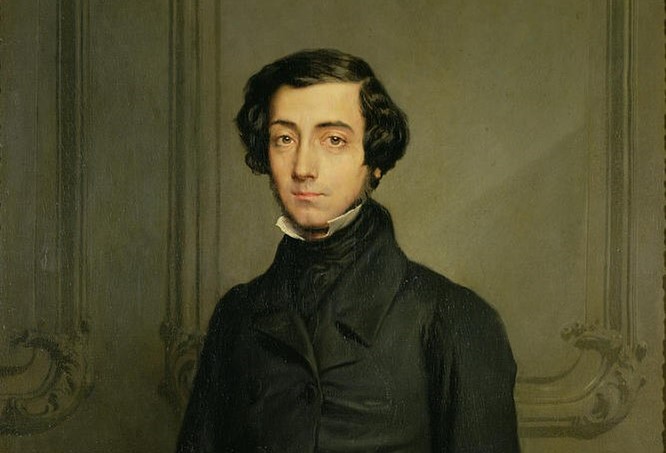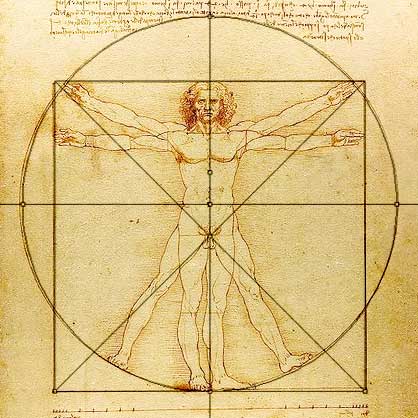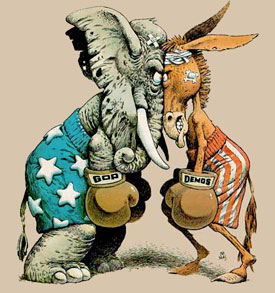It is not uncommon for people to suggest that the idea of American Exceptionalism first appeared in Tocqueville’s two-volume Democracy in America, which appeared in 1835 and 1840, resulting from his visit in 1831-32. Some even cite the following sentence as proof: “The position of the Americans is therefore quite exceptional, and it may be believed that no democratic people will ever be placed in a similar one” (volume II of the 1972 Reeve translation [New York: Knopf], p. 36). Contextually, I believe we can find no proof for the idea of American exceptionalism in this sentence, which appears in a chapter entitled, “The Example of the Americans Does Not Prove that a Democratic People Can Have No Aptitude and No Taste For Science, Literature, and Art.” Note, then, that what Tocqueville was saying was this: Although Americans have “no aptitude and no taste for science, literature, or art,” this does not mean that democratic people in other circumstances would suffer from similar liabilities. That is, he conceded that Americans have no aptitude or taste for science, literature, or art, but argued that this was due to the particular/exceptional American experience and is no natural concomitant to democracy. He expressly conceded this in the first paragraphs of the chapter:
It must be acknowledged that in few of the civilized nations of our time have the higher sciences made less progress than in the United States; and in few have great artists, distinguished poets, or celebrated writers been more rare. Many Europeans, struck by this fact, have looked upon it as a natural and inevitable result of equality; and they have thought that if a democratic state of society and democratic institutions were ever to prevail over the whole earth, the human mind would gradually find its beacon lights grow dim, and men would relapse into a period of darkness.
To reason thus is, I think, to confound several ideas that it is important to divide and examine separately; it is to mingle, unintentionally, what is democratic with what is only American.
This is hardly a ringing endorsement of “exceptional” Americans. That is, far from saying that Americans were “exceptional” in any ordinary or praiseworthy sense of the term, Tocqueville argued that states could operate on democratic principles without becoming American rubes and boobs. What he argued, in the oft-mis-quoted sentence, is that the American experience has certain liabilities; mentioning the fierce austere Calvinism of many of its Puritan forbears (although only three of the original thirteen colonies were in fact Puritan), the free land in the West which leaned more to agrarian than artistic pursuits (“who have fallen upon a new and unbounded country, where they may extend themselves at pleasure and which they may fertilize without difficulty”), and a growing market for goods that encouraged industrial more than artistic or scientific pursuits (“the whole community is simultaneously engaged in productive industry and commerce”). He also indicated that since the English were producing outstanding literature at that moment, the Americans—who shared a common language—had no need to produce their own:
At the head of the enlightened nations of the Old World the inhabitants of the United States more particularly identified one to which they were closely united by a common origin and by kindred habits. Among this people they found distinguished men of science, able artists, writers of eminence; and they were enabled to enjoy the treasures of the intellect without laboring to amass them.
Having mentioned these peculiarities of the American experience, he summarized them in a paragraph that contains the oft-misquoted sentence:
The position of the Americans is therefore quite exceptional, and it may be believed that no democratic people will ever be placed in a similar one. Their strictly Puritanical origin, their exclusively commercial habits, even the country they inhabit, which seems to divert their minds from the pursuit of science, literature, and the arts, the proximity of Europe, which allows them to neglect these pursuits without relapsing into barbarism, a thousand special causes, of which I have only been able to point out the most important, have singularly concurred to fix the mind of the American upon purely practical objects. His passions, his wants, his education, and everything about him seem to unite in drawing the native of the United States earthward; his religion alone bids him turn, from time to time, a transient and distracted glance to heaven.
What was “exceptional” about the American “position” was its peculiar history that had led to its present (to Tocqueville) circumstance, in which the American mind was devoted to little but pragmatic/practical (“earthward”) interests. Only his religion, Tocqueville sighed, occasionally relieved the American of his unseemly mundanity and bid him to a “transient…glance” at more transcendent concerns. The American was “exceptional,” in other words, in his lack of artistic or intellectual culture. But this is not damning with faint praise; this is damning with vigorous criticism, albeit politely expressed. One might as well refer to a failing student as “exceptional,” because all the other students are passing the course. Or imagine a university advertising itself as an “exceptional” university, where it attempted “to divert…minds from the pursuit of science, literature, and the arts.”
Rhetorically, Tocqueville was trying to persuade others that democracy, a then-recently- begun experiment in his native France, was a good form of government; and his problem, rhetorically, was that the American example appeared to provide counter-evidence. Tocqueville was embarrassed by the American experience of democracy, embarrassed that a free people had employed their freedom for merely mundane or commercial pursuits; and so, in order to rescue democracy, Tocqueville argued that it only looked like a bad form of government in America because of America’s peculiar (“exceptional”) history. Freed from this peculiar or exceptional history, Tocqueville argued, democracy should work fine; and even in America it had not caused its exceptional liabilities, which came from other sources.
Whether America ever was or is exceptional is a matter for further discussion; but Tocqueville’s own estimate of America in the early nineteenth century was mixed at best and negative at worst. He obviously wished that democracy had produced a more learned and refined culture than it had in America; and he was quick to argue that democracy would likely produce better fruit in better (French?) circumstances.
Such an argument was necessary because democracy in his native France had little to boast of at the time. It began with la Terreur (1793-94, but perhaps 1789-94), and from 1799-1815 the “Republic” was under the effective monarchy/empire of Napoleon Bonaparte. This historical conundrum should not surprise students of history: the first two experiments in a kind of democratic republic—Greece and Rome—executed the “wisest” Athenian (Socrates), and the only innocent human who ever lived (Jesus). The early experiments in mob rule hardly provided encouragement for later ones. France’s Reign of Terror recorded almost 17,000 executions, with over ten thousand perishing in prison, and these are just the ones for which records exist. By comparison, the Spanish Inquisition—Christianity’s blackest eye—executed between 3,000 and 5,000 people, a small fraction of those murdered by France’s secular “inquisition;” yet hardly a peep is ever uttered over this discrepancy. Democracy, particularly in Tocqueville’s day, had a dubious record.
We need not conclude that nothing has changed since the early 19th century. We now have many institutions of higher learning (and already had over twenty in Tocqueville’s day). There are over a thousand symphony orchestras in the United States, over a hundred of which have regular, 52-week seasons. Our democratic republic is the oldest modern democracy in the world (pre-modern democracies exist in several smaller nations: Iceland, Faroe Islands, Isle of Man). France, whose republic began shortly after ours, is now in its fifth republic, and we are still on our first; so, at least measured by longevity and stability, our founders did something well. Where we are now and where we were when Tocqueville visited are quite different matters, and I have no interest in the question of whether we are or are not “exceptional,” or in what senses. As a matter of fidelity to the historical record, however, respect for Monsieur Tocqueville requires that we either exempt him from the discussion or give him a “Nay” vote.
Image credit: “Alexis de Tocqueville” via Wikimedia Commons












You clarified nuances of “exceptional” well, but your second paragraph puzzled me, especially in light of the final paragraph crowing about symphony orchestras.
“It must be acknowledged that in few of the civilized nations of our time have the higher sciences made less progress than in the United States; and in few have great artists, distinguished poets, or celebrated writers been more rare.”
Really? What planet is that happening on? Probably not the one where US leads in Nobel prizes in science, has a respectable number in literature, as well as tons of support for professional, amateur, and pretend artists in various fields.
I could have glided past this as an indirect reference to the 1830s, but the phrase “our time” precludes that possibility. We may indeed be undermining our ability to reason at a frighteningly rapid pace, but the US still attracts a huge number of graduate students from other countries. Surely they don’t see us as lacking “progress” in the higher sciences.
Historically speaking, the sciences were rather “practical” in de Tocqueville’s time: Franklin and electricity; the unfortunate Hungarian Semmelweis urging fellow doctors to wash their hands before the germ theory was well-established; and early vaccination failures such as Jonathan Edwards due to hit-and-miss dosage.
Comments are closed.